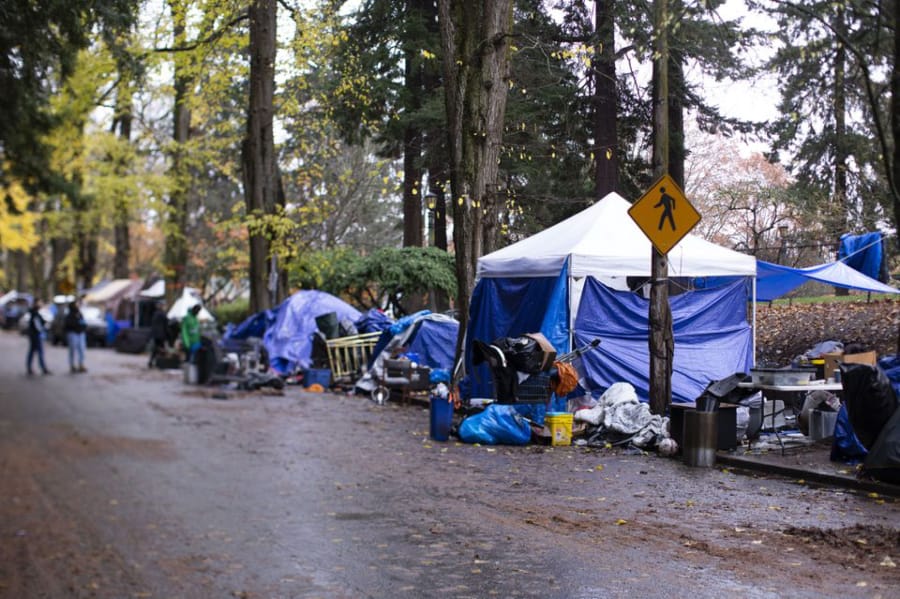PORTLAND — City contractors on Tuesday removed the final remnants of a sprawling encampment along the outskirts of Laurelhurst Park, where about 100 people lived for months among a cluster of tents and other makeshift dwellings that had incensed some nearby residents.
Mayor Ted Wheeler touted the sweep through the wealthy Southeast Portland neighborhood as a model he aims to replicate across the city, despite Oregon’s current record-breaking coronavirus surge and large protests organized against the practice.
“Right now, we have to address the reality that we have hundreds, if not thousands, of tents choking virtually every public space in this city and that does not comport with the public’s expectations of what a humane response should be,” Wheeler said in an interview with The Oregonian/OregonLive.
The mayor’s blunt assessment comes at a precarious time for the city’s homeless population. Autumn’s rain will soon give way to winter winds and temperatures that dip to dangerous lows. It also came as Multnomah County led the state with an average of 322 daily coronavirus cases over a one-week period, nearly triple the 7-day average on Nov. 1.
Such projections prompted Gov. Kate Brown to implore Oregonians to stay home and avoid gatherings of people outside their household, despite the Thanksgiving holiday.
“I want to be clear,” Wheeler said Tuesday. “There is no easy solution here. If people are looking for an easy solution, they’re going to be disappointed.”
Fewer sweeps
Portland completely halted campsite removals at the beginning of the coronavirus pandemic, citing guidance from the Centers for Disease Control and Prevention that aimed to slow the spread of the disease.
They resumed again in a limited capacity at the end of July, city officials said, though only for large encampments officials felt posed significant public health or safety risks.
Heather Hafer, a spokeswoman for Portland’s Homelessness and Urban Camping Impact Reduction Program, said the city currently clears about three encampments a week. Prior to the pandemic, the weekly number ranged between 40 and 60, she said.
Persistent reports of drug use, residential complaints and inadequate hygiene and social distancing made the Laurelhurst encampment a target under the city’s revised protocols for removal, Hafer said.
The looming sweep prompted dozens of protesters to gather at the park on multiple days, decrying the city’s attempt to displace those living near there.
But the campers weren’t dispersed in one fell swoop, and city officials said they planned to clear the site in conjunction with the opening of a shelter at Mt. Scott Community Center in early November.
Outreach workers and volunteers then spent days referring them to the shelter before they began clearing the encampment last week, according to city officials and the mayor.
Wheeler said this approach, where the city provides advance notice of a sweep as well as a safe alternative for homeless campers, strikes a necessary balance and provides a template for future campsite removals.
“While we want to be compassionate to those on the streets, we have to respect the fact that people don’t want their doorways blocked, they don’t want their businesses blocked, they don’t want sidewalks impeded,” he said.
‘Soul damage’
Homeless advocates strongly disagree.
“This is a violation of human dignity,” said Aimee Niles, a hospital chaplain and a member of Portland Interfaith Clergy Resistance who provided assistance to campers who remained at Laurelhurst on Monday.
“To have this happen on the week of Thanksgiving, to come through here to take away someone’s home — that’s soul damage.”
Molly Pringle, the executive director of Portland Street Medicine, whose volunteer doctors, nurses and social workers provide health care to the city’s homeless, said the sweeps also may increase the chance of spreading COVID-19.
“When you’re dismantling a large encampment, folks are more prone to possible exposure from different communities,” Pringle said. “That poses a significant health risk.”
Wheeler pushed back on some of those concerns, saying shelters or city-sponsored campsites follow coronavirus protocols — such as physical distancing — and other public health recommendations.
“There’s no question in my mind that the alternative we’re offering is much safer and much healthier than just letting an indefinite number of people live in a huddle outside in a park,” he said.
A slow process
Still, it appears that most of the Laurelhurst campers are not immediately flocking to the alternative.
City officials said outreach workers referred 62 people from the park to the Mt. Scott Community Center. But only 26 have showed up through Tuesday, said Julie Sullivan-Springhetti, a spokeswoman for Multnomah County.
Meanwhile, others are moving to different street encampments, including one that’s growing outside the Sunnyside Environmental School — seven blocks from Laurelhurst Park.
Wheeler said he’s not discouraged.
“Success is getting people out of the elements, off the sidewalks and either into shelter in the near term or some alternative safe campsite and into housing in the long term,” the mayor said.
“At the end of the day, we can’t just say because it doesn’t work on a large scale for everyone right now we should just throw our hands in the air and give up. I don’t believe that.”



